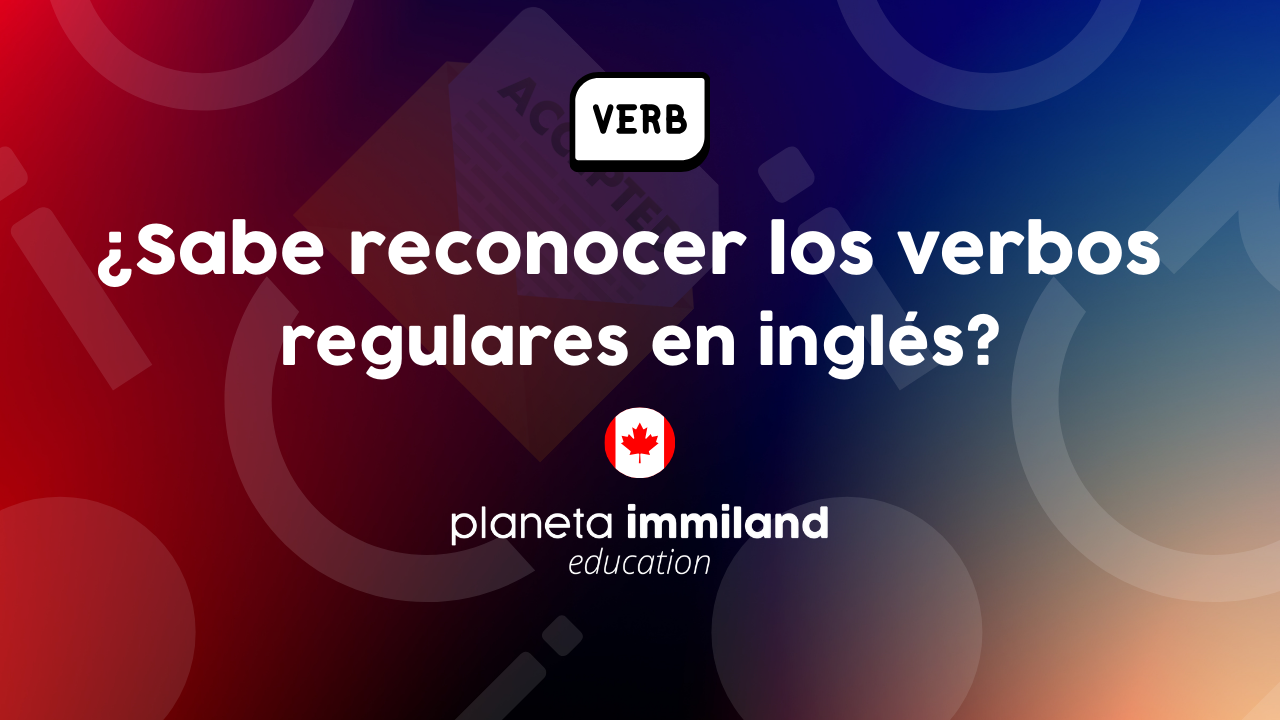Do you know how to recognize regular verbs in English?
Mar 04, 2025
Written by Gabriela Estrada
Knowing which are the regular verbs in English and when to use them is basic to raise the level of the language; of course, other knowledge about grammar is required, but the correct use and conjugation of these verbs is what allows effective communication. Often, students of English get confused when recognizing these verbs, so we will address this topic in a practical and simple way.
In this article of our Planeta Immiland Education blogblog, I will share a a simple guide to learn what regular verbs are, how to identify themhow to identify them and how they compare to their Spanish equivalents for better understanding. Read with me to the end and take note of the most useful strategies to remember what these verbs are and apply them to your level of English. Let's get started!
What are regular verbs?
Regular verbs are those that follow a fixed and predictable fixed and predictable pattern when conjugated in the different tenses. The key to recognizing regular verbs in English is to observe how their past simple and past participle tenses are formed. how their past simple and past participle tenses are formed, which are formed with the addition "-ed" at the end of the verb.
For example:
- Regular verb: Work (work) → Simple past verb/participle: Worked (worked/worked)
Here, the fixed guideline in Work is complemented by "ed to form the past.
The same can be seen in these examples:
- Play (play) → Played (played)
- Listen (listen) → Listened (heard/listened)
In the Spanish equivalent, regular verbs also follow a fixed pattern when conjugated, although there are three different conjugations (-ar, -er, -ir). For example:
Workar (to work) → I worked (I worked)
Responder (to answer) → I answered (I answered)
Vivir (to live) → Viví (I lived)
Although in this blog we focus on describing regular verbs in English, it is important to briefly compare them with irregular verbs to distinguish one from the other. In contrast, irregular verbs do not follow a fixed rule (In another topic of our blog, we will discuss this as well).
Recognizing and applying regular verbs in a written or oral conversation is also a matter of knowing how to conjugate them, taking into account that these remain fixed and in any case the person who undertakes the action varies, whether it was one or several people and when the action was carried out.
All verbs indicate a state or an event, they are one of the fundamental parts of speech and their proper use allows us to form coherent and understandable sentences. This is why it is necessary to learn to distinguish a regular verb from an irregular verb or an auxiliary verb.
What is it to conjugate a regular verb in English?
To conjugate a regular verb in English means to change its form to indicate when the action occurs (time), who performs the action (person) and in what quantity (singular or plural). Let's remember what we mentioned at the beginning: regular verbs follow a fixed pattern or rule to form their verb tenses.
For example, in the conjugation of another regular verb:
- To clean (clean)
- Present simple in the first person: I clean (I clean); in the second person: You clean (you clean); in the third person: He/She/It cleans (he/she/it cleans), etc.
- Past simple in the first person: I cleaned (I cleaned); second person: You cleaned (you cleaned); in third person: He/She/It cleaned (he/she/it cleaned).
Do you realize that this verb remained fixed and varied in the past tense with the complement "-ed" at the end, moreover, the person was the one who changed?
Strategies for remembering a regular conjugation
An effective strategy for remembering the conjugation of regular verbs in English is to repeat tasks with these verbs and do constant practice with each one. Here I share some specific activities that work very well for review at home:
- Make study cards:
- Create cards with the regular infinitive verb on one side and its conjugated form in the simple past on the other. Review these cards regularly.
- Practice with writing:
- Write sentences using regular verbs in the present and past tense and with different people. Repeating this will help fix the correct forms in your memory.
- Perform audio and pronunciation exercises:
Listen to examples from native speakers or bilingual teachers and repeat the conjugations aloud. This also helps develop your lip and tongue muscle memory.
Mastering regular verb conjugation is critical to improving your English fluency. Constant practice and the use of memorization strategies will help you remember and use the correct forms.
Would you like to recognize other English verbs or more advanced grammatical structures? Planeta Immiland Education offers English and French courses that can help you. Visit our website: https://www.planeta-immiland-education.com/ and discover our academy.
We are the first language school for immigration purposes in Canada. If you would like to start an English course with us, contact us at and we will be happy to help you with whatever you need.
Thank you very much for reading us! See you in the next blog.
With love,
Planeta Immiland Education
Not sure about your level of English or French? Don't worry!
At Planeta Immiland Education we offer a free online placement test to help you find out your language level and design a personalized study plan for you. Find out your English or French level in a few minutes and start improving your language skills today!
Subscribe to our mailing list.
Leave us your contact information to learn more about our courses, tips, and promotions.


